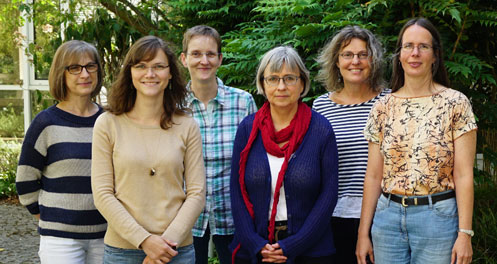DFG grants award for a method to replace animal tests
15 / 2016 (Translation German Press Release of 29 September 2016)
Researchers of the Paul-Ehrlich-Institut received the Ursula M. Händel Prize for Animal Protection (Ursula M. Händel-Tierschutzpreis) for a new method which is used to test botulinum neurotoxins and which can replace distressing animal tests to a large extent.
The President of the DFG (Deutsche Forschungsgemeinschaft, German Research Foundation), Professor Dr Peter Strohschneider, awarded this 100,000 Euro prize to Dr Beate Krämer, Dr Birgit Kegel, and their team, Dr Heike Behrensdorf-Nicol, Ursula Bonifas, Jolanta Klimek and Emina Wild of the Division Veterinary Medicine at the Paul-Ehrlich-Institut (PEI). With their development of a new in vitro test method, the five researchers have made a special contribution to animal protection in research. Professor Klaus Cichutek, president of the Paul-Ehrlich-Institut called it "a trendsetting success". "The PEI's conception to use synergies from basic research and marketing-authorisation related research as well as the findings from practical experience, marketing authorisation, and testing of biomedicines has once again proven to be beneficial."
 The Researchers: Jolanta Klimek, Emina Wild, Ursula Bonifas, Dr. Birgit Kegel, Dr. Beate Krämer, Dr. Heike Behrensdorf-Nicol (from left)
Source: PEI
The Researchers: Jolanta Klimek, Emina Wild, Ursula Bonifas, Dr. Birgit Kegel, Dr. Beate Krämer, Dr. Heike Behrensdorf-Nicol (from left)
Source: PEI
Fourteen applications were received for this award. The team from the Paul-Ehrlich-Institut finally turned out to be the most convincing one. The researchers succeeded in mimicking the most relevant mechanism of the toxin's muscle-relaxing effects. The development of the new test method largely contributed to the 3R principle (reduction, refinement, and replacement). Thanks to this method, large-scale animal tests could be avoided in future – around 600,000 animals per year are affected.
Botulinum neurotoxins, which are produced by bacteria, lead to muscle paralysis in humans and animals. Based on this characteristic, neurotoxins are an important active ingredient in medicines for the treatment of various neurological disorders. Besides, they are used in the cosmetic sector. As a standard requirement, these active ingredients must be tested in mice, before they can be used in medicinal and cosmetic products. The new method refers to an in vitro test without using mice. This test, which is also called BINACLE test has another benefit: It clearly reacts more sensitively to the neurotoxin.
BINACLE test significantly more sensitive than animal test
Botulinum neurotoxins consist of two sub-units: A heavy chain binds to neuronal cells via receptors, and a light chain enzymatically cleaves a substrate, thus preventing the release of the neurotransmitter acetylcholine which leads to muscle paralysis. The test developed by the research team emulates this mechanism in vitro. Receptor molecules fixed to a microtiter plate bind to the toxin. It is then cleaved by reduction. The light chain thus separated is then placed onto a second microtiter plate, where the molecules cleave a substrate protein. Then an antibody is added that specifically recognises the cleaved product. This antibody is finally detected by a reaction leading to a colour change. This provides proof of the botulinum neurotoxin activity.
The scientists are planning on using their award money for an international collaborative study to prove that this test can be transferred to other labs. It is not until this proof has been provided that the legal regulations can be changed in the European Pharmacopoeia. Once the test method has been included in this monograph, this alternative for animal testing will become a standard method which is legally binding.
The Ursula M. Händel Animal Protection Award bears the name of its founder who initiated this award. The founder, Ursula M. Händel (1915–2011) who lived in Düsseldorf was committed to animal protection for many decades in various respects. Thus, she founded the "Bonner Arbeitskreis für Tierschutzrecht" (Bonn Animal Protection Working Party) whose work partly laid the foundations for the amended German Animal Protection Law. Thanks to her special commitment to animal protection, Ms Händel contributed the funds for animal protection to the DFG. The prize, which is awarded every two years, is designed to constitute an award in particular for scientific research projects contributions to the reduction of the burden in animals used in animal tests, to reduce their number, or to replace them entirely.
Press Contact:
Paul-Ehrlich-Institut
Press Office
Dr. Susanne Stöcker, Dr. Corinna Volz-Zang, Brigitte Morgenroth
Paul-Ehrlich-Straße 51-59
63225 Langen
GERMANY
Telefon: +49 6103 77 1030
Telefax: +49 6103 77 1262
Email: presse@pei.de
The Paul-Ehrlich-Institut, the Federal Institute for Vaccines and Biomedicines, in Langen near Frankfurt/Main is a senior federal authority reporting to the Federal Ministry of Health (Bundesministerium für Gesundheit, BMG). It is responsible for the research, assessment, and marketing authorisation of biomedicines for human use and immunological veterinary medicinal products. Its remit also includes the authorisation of clinical trials and pharmacovigilance, i.e. recording and evaluation of potential adverse effects.
Other duties of the institute include official batch control, scientific advice and inspections. In-house experimental research in the field of biomedicines and life science form an indispensable basis for the manifold tasks performed at the institute.
The Paul-Ehrlich-Institut, with its roughly 800 members of staff, also has advisory functions nationally (federal government, federal states (Länder)), and internationally (World Health Organisation, European Medicines Agency, European Commission, Council of Europe etc.).
top



